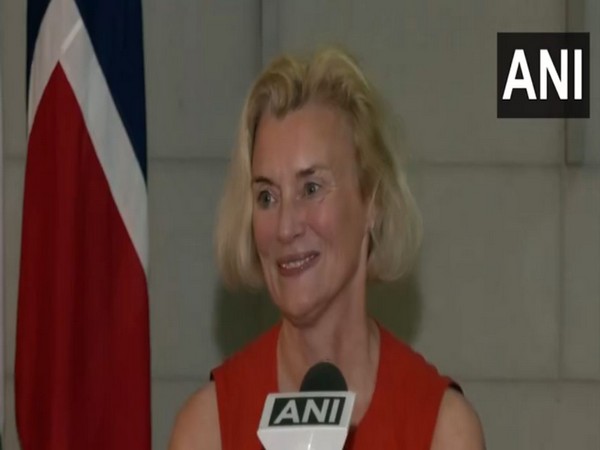As Norwegian Ambassador to India, May Elin-Stener, completes her first year in office, she reflects on her journey with a mix of nostalgia and excitement.
In an interview with ANI, the envoy showcased her prowess at speaking Hindi and did not shy away from reciting her favourite dialogue from a Bollywood movie.
“Picture abhi baaki hai, mere dost,” that roughly translates to “the story is still unfinished, my friend,” Stener said.
With a warm smile, Stener expressed her joy at being in India, “Mai dil se bol rahi hoon, mai Bharat aa kar bahut khush hoon. Bharat mein hone ka yeh achha samay hai…”, (I am speaking from my heart, I am very happy to come to India. It’s a great time to be in India).”
Highlighting her favorite memory of the past year, the envoy mentioned the historic EFTA (European Free Trade Association) agreement signed between India and EFTA countries (Switzerland, Norway, Iceland, Liechtenstein) in March this year.
“We have achieved one big thing this year. On March 10, we signed the trade and economic partnership agreement between EFTA and India. And for us, that means so much after all these years of negotiations, lifting the bilateral relationships to a higher level,” said the Norwegian ambassador.
Stener, who presented her credentials to President Droupadi Murmu in August last year, emphasised the significance of India-Norway relations and said that there is so much to learn from Indian cultural diversity, and its traditional facets and that India has so much to contribute to the world.
The envoy also underlined the importance of India-Norway relations and said that since India is one of the fastest-growing economies in the world, it is obvious for Norway to look at India for its country’s growth.
“India has such a rich history. It’s such a vast country. You go to every state, and it’s also a completely different culture. There is so much to learn, and India has so much to contribute to the world, which you are doing,” said the envoy.
“India is the most focused country. It’s the fifth-largest economy. It is not possible for Norway to not look to India if we want green growth. So that’s important for us to have that relationship, right?” added the envoy.
The envoy shared her fond memories of exploring India, including visiting Varanasi for Dev Deepawali, participating in a beach clean-up in Mumbai, attending the literature festival in Jaipur, and marvelling at the iconic Taj Mahal in Agra.
As one of the few women ambassadors in India, Stener stressed the importance of gender equality in the workplace.
“I believe there are 25 women ambassadors in Delhi. Now, about me being a Norwegian, this journey started when I was very young in the 80s. In Norway, there was a lot of talk about getting women into the workplace. And when I started working in the Foreign Service after a few years, it has also been important for our leaders, men and women, to get women into management positions. And last year, when I became ambassador, it was the first year that Norway had 50 per cent women ambassadors abroad. I think that’s a big achievement. It has taken a long time, but I really hope it can be a good example for other countries,” said the envoy.
Further speaking about the high-level visit and the upcoming India-Nordic summit that is expected to take place in Oslo, the envoy said that she ”hopes to receive the Indian Prime Minister in Oslo very soon” and that the “summit in the next few months”.
India’s economic and commercial ties with Norway are on the upswing. There has been a spurt in trade, investments, the transfer of technology, and other contacts.
The current growth in Indo-Norwegian eco-commercial ties has been fuelled by common interest, in sectors such as deep offshore, shipping, hydroelectricity, information technology, biotechnology, and light consumer goods. Norwegian IT companies are also looking at offshoring their business to India or investing in Indian start-ups.
The relationship between India and Norway is built on excellent political exchanges and bilateral institutional mechanisms, with cooperation in the Blue Economy for sustainable development being a cornerstone of their partnership.-ANI


